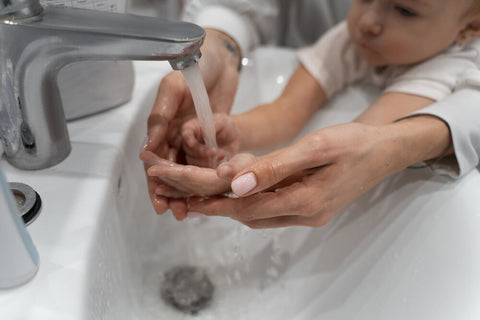
After proclaiming Tawhid (Oneness of Allah SWT), Salah stands as the second most important Article of Faith that Muslims are obligated to follow. To pray Salah or any other related form of worship, wudhu (ritual ablution) is a pre-requisite Muslims are required to perform to achieve purification. This rewarding and virtuous ritual ablution, mentioned in detail in Islamic Law, is not merely an exercise in washing certain body parts to clean them but also a step towards spiritual purification. Islam stresses upon the importance of purifying our bodies because it strengthens our souls and thus brings us closer to the One who is the Creator of all. The Quran mentions the washing of the obligatory parts:
O you who believe, when you rise for Salāh, (prayer) wash your faces and your hands up to the elbows, and make Masah (wiping by hands) of your heads and (wash) your feet up to the ankles. (5:6)
Wudhu therefore is the simple yet obligatory exercise of washing certain body parts in a certain order and the Fardh (mandatory actions include washing the face, arms, then wiping the head and the feet with water. The wudhu procedure is based on Fiqh rulings (Islamic jurisprudence) which specifies rules regarding hygiene and the rituals that form a part of it. It is important to understand that the state of wudhu is not a continuous one and there are certain actions that nullify wudhu thus making one exit the state. Actions that nullify wudu can broadly be stated to include urination, defecation, flatulence, deep sleep, light bleeding, menstruation, postpartum and intercourse.
Importance of Wudhu
The very fact that no prayer is valid without wudhu is enough evidence to indicate the significance of Wudhu. It is not just a ritual of cleaning but a connection to faith that leads to spiritual cleaning as well through expiation of sins. It is narrated in a hadith that:
"The Messenger of Allah ﷺ said: 'When a person performs ablution and washes his hands, his sins exit through his hands. When he washes his face, his sins exit through his face. When he washes his forearms and wipes his head, his sins exit though his forearms and head. When he washes his feet, his sins exit through his feet.'" Sunan Ibn Majah 283
It is significant to note that water is the purifying agent in ablution and emphasis has been laid on avoiding wastage of water in multiple Ahadith, highlighting the promotion of Environmental Sustainability in Islam and the utilization of water resources.
Benefits of Wudhu
While performing Wudhu purifies our body, it has the added advantage of inducing benefits that positively impact our mental and physical well-being. Some of these benefits include:
- Keeps our skin looking fresh and young
- Improves Blood flow and mental health
- Stops germs from entering the body
- Helps maintain oral hygiene
- Prevents wax buildup
Practical Tips to Maintain Wudhu
Maintaining wudhu for some time is a common enough struggle many Muslims face, especially in the case of praying in congregation or engaging in long prayers like Tahajjud and others. Apart from sudden and unexpected nullification which is involuntary, like bleeding and vomiting, there are other nullifiers which can be stopped or controlled to some extent in order to prolong one’s wudhu to be able to pray peacefully or any form of worship that requires wudhu.
Some people have to redo their wudhu and are unable to stay in the state for long, even when taking special care with their diet. At times, when one is on the verge of breaking one’s wudhu, there is hardly any stopping. The ABDEEZ Wudhu Socks are a blessing in disguise for such people (and the Muslim Ummah in general), especially in chilly winters to provide ease in washing the feet once they are worn after entering in state of wudhu.
Certain practical tips have been mentioned to help people maintain wudhu.
- Fiber Intake
Among the major cumbersome causes for wudhu breakage are constipation and gas which can cause wudhu problems at inconvenient times. Having a balanced diet including fiber rich food in your everyday lives and avoiding fizzy drinks, goes a long way in eliminating the risk of wudu nullification from gas.
- Avoiding Fluids
When you’re planning to maintain wudhu for more than just to pray the required salah, it is prudent to limit your fluid intake and only consume what is necessary. A full bladder can swiftly become a menace, and any visit to the toilet will break the wudhu. So, while the temptation and craving might draw your attention towards sodas, juices or milkshakes, it might just be better to simply wait until you have easy access to a bathroom.
- De-stress and Relax
Once you have done your wudhu and are all set to begin your prayer, recitation or even wait until you perform any worship, relax and completely avoid giving any extra thought to your wudhu. Vacillating between whether it is broken or not broken, will continuously keep you in a state of turmoil and might give cause to the actual breaking of the wudhu.
- Use Bathroom Before travelling
If one intends to maintain wudhu for a longer time, a simple rule is that one should eliminate all possibilities of necessary actions that will lead to wudhu nullification. Using the toilet and performing ablution right after is a smart move and if one takes care of the other possibilities as well, it is quite possible to maintain the state of wudhu, provided there are no sudden nullifiers.
- Avoiding Food that Cause Gas
Certain foods are more likely to cause gas than others and should be avoided or consumed in less quantity if one wants to maintain wudhu for a longer period, especially in the taraweeh Jama’at or similar. Beans and lentils fall into this category as well as some vegetables like broccoli and cauliflower.
Bibliography
7 proven health benefits of ablution (Wudhu). IslamicFinder. (n.d.). https://www.islamicfinder.org/news/7-proven-health-benefits-of-ablution/
Chapter: The Reward of Purification. Sunan ibn majah 283 - The book of purification and its Sunnah - كتاب الطهارة وسننها - sunnah.com - sayings and teachings of Prophet Muhammad (صلى الله عليه و سلم). (n.d.). https://sunnah.com/ibnmajah:283
Jannah Firdaus Mediapro Art & Story. (2022, November 1). The benefits of Wudhu (ablution) in Islam for Body Health & Spiritual Healing English version. Medium. https://medium.com/@xenovandestra/the-benefits-of-wudhu-ablution-in-islam-for-body-health-spiritual-healing-fd560a6f5ae6
Surah al-Ma’idah - 1-120. Quran.com. (n.d.). https://quran.com/5?startingVerse=6
Zarairfan. (2019, May 9). Importance of wudu: Significance and benefits in the light of Quran and Hadith. Islamic Articles. https://www.quranreading.com/blog/importance-of-wudu-significance-and-benefits-in-the-light-of-quran-and-hadith/

Share:
Creating a Personal Space for Prayer at Home
The Green Deen: Islam’s Teachings on Environmental Protection